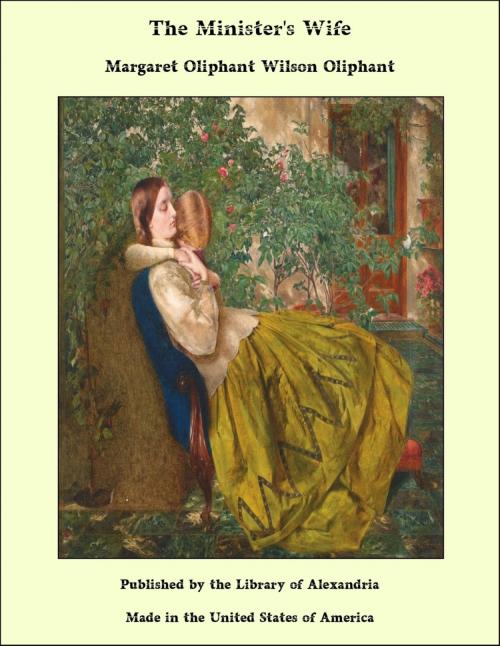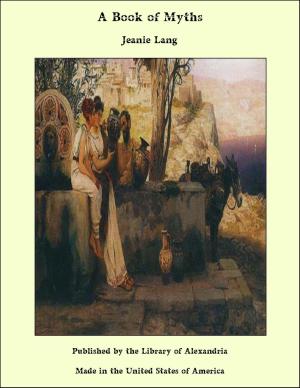| Author: | Margaret Oliphant Wilson Oliphant | ISBN: | 9781465623935 |
| Publisher: | Library of Alexandria | Publication: | March 8, 2015 |
| Imprint: | Language: | English |
| Author: | Margaret Oliphant Wilson Oliphant |
| ISBN: | 9781465623935 |
| Publisher: | Library of Alexandria |
| Publication: | March 8, 2015 |
| Imprint: | |
| Language: | English |
The Glebe Cottage at the head of Loch Diarmid was something between a primitive cottage and a little house of gentility, commonly called by that name. The hill-side of which it was the sole inhabitant had once been ecclesiastical soil belonging to the church of Lochhead, which was about a mile distant across the braes—and still, so far as this one dwelling was concerned, retained the name. It had originally been a building of one story thatched and mossy; but lately a few additional rooms had been built over one part of it, and covered with respectable slates. It was composite and characteristic, a human thing, growing out of human rules, and consequently more picturesque than if it had been the result of the most picturesque intention. The thatched end of the cottage was surrounded by no enclosure; the soft rich mossy grass of the hills broken by great bushes of heather pressed up to its very walls; while the other half, or western end, was cultivated and formed into a pretty homely garden. Hardy roses and honeysuckles, and a wavering wealth of fuchsias, hanging rich with crimson bells, clothed the southern front and west end—the refined part of the cottage. On the mountain side, there was nothing but the rough, low whitewashed wall, the overhanging thatch, the heather within a yard of the house. And here, some thirty years ago, lived a family of Diarmids, as curiously varied in internal constitution as was the aspect of their home. The father of the household had been a soldier ‘in the war,’ and, though little more than a peasant by birth, had risen from the ranks and won his commission by sheer daring and bravery. It is very doubtful whether he was much the happier for it. When he had won his epaulettes another piece of luck befell him: he caught the eye and fancy of a pretty, romantic girl, who married him for his valour and his inches and his red coat. To him she was an heiress, though the actual amount of her wealth was small. Probably he meant, in his gratitude and pride, to be a good husband and live happy ever after, and for this end bought the cottage he had been born in, and added some modern additions to it for the comfort of his lady-wife. But Duncan was Duncan still, notwithstanding his good fortune and his epaulettes; and his poor young wife, finding out her mistake, died at the end of a year or two, after bringing a pair of twin girls into the world. After this Captain Diarmid saw a great deal of service in all quarters of the world, and when he came back married again, a homely ‘neighbour lass,’ and died after she too had become the mother of two children. They all lived together in the Glebe Cottage—two sets of people as different as could well be conceived. During the Captain’s lifetime a certain arbitrary link united them; but after his death it was not expected by the country-side that there could be any further family union between the twin sisters to whom everything belonged, and the homely widow with her girl and boy. It was a wonder to many of the genteel people of the neighbourhood when it was discovered that Margaret and Isabel meant to permit their father’s widow, Jean Campbell, to share their house. Even old Miss Catherine at the Lochhead gave it as her opinion that ‘Jean and her bairns had no claim on them.’ But the sisters, it was evident, thought differently, though it was not without a certain conflict within and between themselves that the decision was made. They were then between nineteen and twenty, two girls who had grown up as Nature would, with little training of any description, but with that curious refinement of race or tradition which is so often to be found in those who, springing from a higher origin, have yet lived chiefly among the poor.
The Glebe Cottage at the head of Loch Diarmid was something between a primitive cottage and a little house of gentility, commonly called by that name. The hill-side of which it was the sole inhabitant had once been ecclesiastical soil belonging to the church of Lochhead, which was about a mile distant across the braes—and still, so far as this one dwelling was concerned, retained the name. It had originally been a building of one story thatched and mossy; but lately a few additional rooms had been built over one part of it, and covered with respectable slates. It was composite and characteristic, a human thing, growing out of human rules, and consequently more picturesque than if it had been the result of the most picturesque intention. The thatched end of the cottage was surrounded by no enclosure; the soft rich mossy grass of the hills broken by great bushes of heather pressed up to its very walls; while the other half, or western end, was cultivated and formed into a pretty homely garden. Hardy roses and honeysuckles, and a wavering wealth of fuchsias, hanging rich with crimson bells, clothed the southern front and west end—the refined part of the cottage. On the mountain side, there was nothing but the rough, low whitewashed wall, the overhanging thatch, the heather within a yard of the house. And here, some thirty years ago, lived a family of Diarmids, as curiously varied in internal constitution as was the aspect of their home. The father of the household had been a soldier ‘in the war,’ and, though little more than a peasant by birth, had risen from the ranks and won his commission by sheer daring and bravery. It is very doubtful whether he was much the happier for it. When he had won his epaulettes another piece of luck befell him: he caught the eye and fancy of a pretty, romantic girl, who married him for his valour and his inches and his red coat. To him she was an heiress, though the actual amount of her wealth was small. Probably he meant, in his gratitude and pride, to be a good husband and live happy ever after, and for this end bought the cottage he had been born in, and added some modern additions to it for the comfort of his lady-wife. But Duncan was Duncan still, notwithstanding his good fortune and his epaulettes; and his poor young wife, finding out her mistake, died at the end of a year or two, after bringing a pair of twin girls into the world. After this Captain Diarmid saw a great deal of service in all quarters of the world, and when he came back married again, a homely ‘neighbour lass,’ and died after she too had become the mother of two children. They all lived together in the Glebe Cottage—two sets of people as different as could well be conceived. During the Captain’s lifetime a certain arbitrary link united them; but after his death it was not expected by the country-side that there could be any further family union between the twin sisters to whom everything belonged, and the homely widow with her girl and boy. It was a wonder to many of the genteel people of the neighbourhood when it was discovered that Margaret and Isabel meant to permit their father’s widow, Jean Campbell, to share their house. Even old Miss Catherine at the Lochhead gave it as her opinion that ‘Jean and her bairns had no claim on them.’ But the sisters, it was evident, thought differently, though it was not without a certain conflict within and between themselves that the decision was made. They were then between nineteen and twenty, two girls who had grown up as Nature would, with little training of any description, but with that curious refinement of race or tradition which is so often to be found in those who, springing from a higher origin, have yet lived chiefly among the poor.















